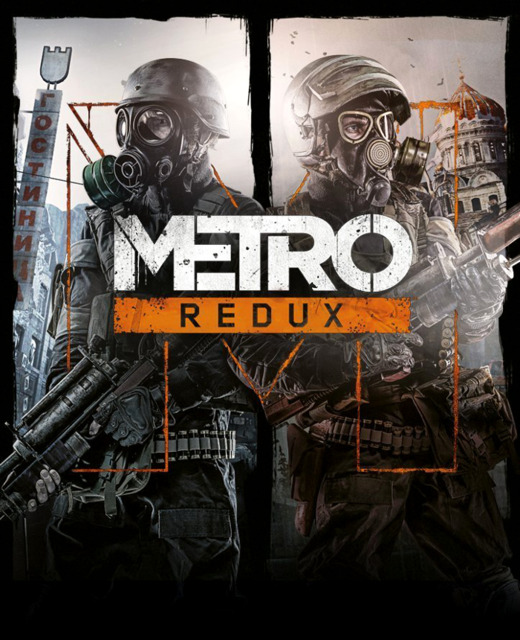Metro 2033 Redux Review: See The Light
Did I accidentally fall through a portal from 2013? Because in their refurbished glory, Tomb Raider, The Last of Us, and Diablo III have topped sales charts once again. These masterpieces became the talk of the town during their respective launch months, two years running. They were prom queens: loved by fans and envied by their rivals. With the onset of new console hardware, then, why wouldn’t developers gamble on the visual perks (and profits) of the PS4 and Xbox One?
It’s just, some definitive editions earn their makeovers. Metro Redux, starring remasters of Metro 2033 and Metro: Last Light, joins the esteemed ballot of current-gen ports. But the contents within justify 4A Games’ added labor. Metro 2033 – the adaptation of the Dmitry Glukhovsky novel – has not held up to the graphical scrutiny of newer PC benchmarks. Awkward controls, obscenely stupid AI, and technical mishaps pressured players to search for the game’s beauty beneath blemished skin.
Metro 2033 Redux makes that task tremendously easier. To not recognize the artistic improvements would require serious rose-tinted glasses. Exhibiting the 4A Engine’s latest tweaks, like a buttery-smooth sixty frames per second, 2033 Redux dresses in the cloak of a legitimate present-day shooter. Reworked lighting, advanced shadows, improved render distances, harsher weather effects, the intuitive HUD, and NPCs that look like humans instead of clay dolls guarantee nobody will want to go back to the antiquated version of Metro 2033.
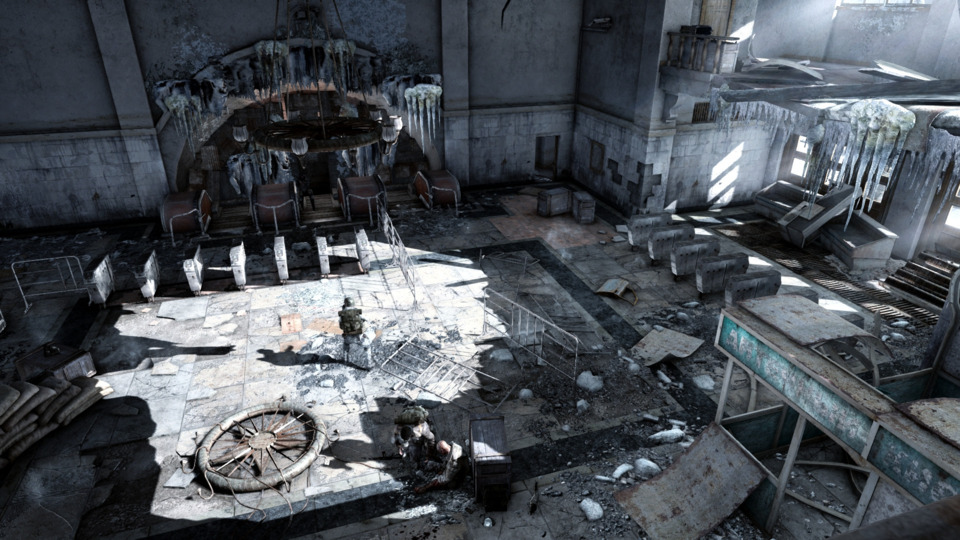
Such fixes enrich the immersion that runs circles around similar apocalyptic scenarios, so if you have not played a Metro title before, a brief synopsis is in order. Twenty years in the future, a nuclear genocide incinerated Russia, poisoning the surface and the animals that occupied it. Only the people that fled into Moscow’s radiation-free metro survived and later thrived (as much as one could in a place of starvation, disease, and unrelenting monsters). Now, the few that do venture above ground prepare for the worst.
4A Games preserves the narrative, meaning Artyom is still one unlucky bastard. When a race of telepathic beings called the Dark Ones starts driving Moscow’s ragtag soldiers psycho, the unfortunate, albeit true to his word, Artyom leaves behind his home to locate his lost uncle. Can he eradicate this supernatural threat? Can Artyom withstand their invasive mind control, where visions condense every fear-filled experience into a tangible nightmare? Understandably, most humans seldom survive contact, and even less maintain their sanity.
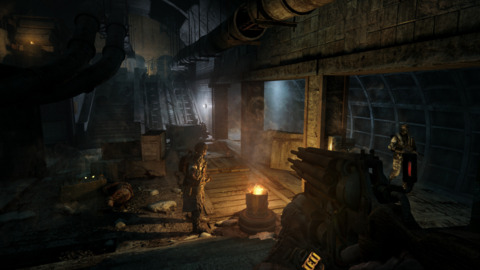
If the Dark Ones do not get Artyom, the feral predators inhabiting Moscow’s ruins might. An unforgiving glamor haunts the urban settings that harbor mutant moles, flying gargoyles, and spiders the size of large dogs. The creatures hunt in packs, too, and one of many apprehensive realizations is hearing the sinister click of an empty magazine when a nosalis howls for its kin. The city feels frighteningly alive, physically warning you to turn back or face the elements. Daily snowfalls freeze refugees, thunderstorms obscure an explorer's vision, and the toxicity of the Earth’s exterior kills the gas maskless in minutes.
To counter, 4A Games heightens survival odds with a natural user interface. No oxygen meters, mission markers, or radar blips clutter the screen. Need to wipe blood or rain off the visor? Tap the shoulder button. Uncertain how long a gas mask's air filter will last, or whether bandits can see your approach? Check your watch. Cobwebs obstructing your path? Torch ‘em with the lighter. Flashlight batteries slowly fizzling out? Equip the charger and get cranking.
The interactions always relate to the situation, though the rest of Metro 2033’s world has also been carefully planned out. The weapons are not what you would call “cutting edge”; our ancestors would look upon them and frown. Held steady by spare pipes, rotten lumber, and electrical wire, each shot echoes with the gun’s dying breath, from the pitiful pops of the SMG’s discharge to the light creaks of the bolt-action rifle’s spring reloading another round. When most shooters want to deliver the maddest building-wrecking arsenals known to man, I embraced scraping by on the efforts of a civilization in squalor, just doing what it can to endure another day.
The currency is also unconventional. What good would money do when bullets actually keep people safe at night? Clean military-grade shells possess a greater barter value than dirty mass produced ones, so it literally pays to scavenge. Bullets buy new scopes, stocks, and barrels for Artyom’s guns – a Last Light addition retrofitted for 2033 – though they still overheat, jam, and run out of air pressure. Factoring in Last Light’s control changes as well, fans should notice how much smoother Metro 2033 Redux plays.
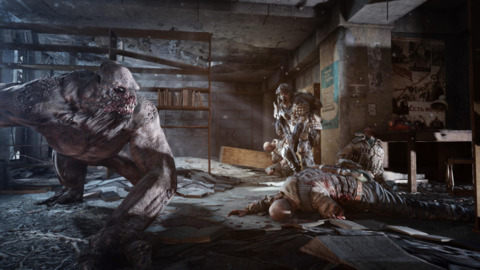
From a responsiveness standpoint, I forgot about the gamepad in my hand. Critics usually slander horrendous control schemes but rarely praise them when the inputs perform as expected. Metro Redux is an example of the latter. Using R1 to pull up a menu that maps medkits, the battery charger, and the remaining tools to the face buttons seems like one step too many. Once I got into a rhythm, however, I had trouble regressing to the original Metro 2033's defective layout.
The gameplay nuances extend to the fool-proof stealth system lifted from Last Light. Players can execute takedowns, lethal or not, against guards, and shooting lights alerts enemies exclusively in the nearest vicinity. While sensical in hindsight, it cannot be overstated how simultaneously dumb and ruthless Metro 2033’s AI behaved. Foes would absentmindedly shuffle between cover when Artyom disappeared from view. Now, they peek over sandbags or around corners, not afraid to suppress his attacks.
New difficulty modifiers put the onus on fans to conserve rounds when shit goes down, or to live out secret power fantasies. Survivor mode limits the spare bullets, medpacks, and assets littering Moscow’s inhospitable lands. Each explosive is a triumph over death, and playing through Ranger difficulty, which increases firearm damage and removes basic HUD elements such as ammo counters, is an experience fraught with paranoia. Do you scour those side tunnels for supplies when demons lurk inside? Spartan mode allows some leeway in how you brave encounters, upping bullet reserves in magazines and your pockets. Every corpse looted is like Christmas morning, gifting more health kits and air filters than you can hold. Survivor remains the purest way to play Metro, but Spartan lets people cherish the cult narrative without checking over their shoulders every couple seconds.
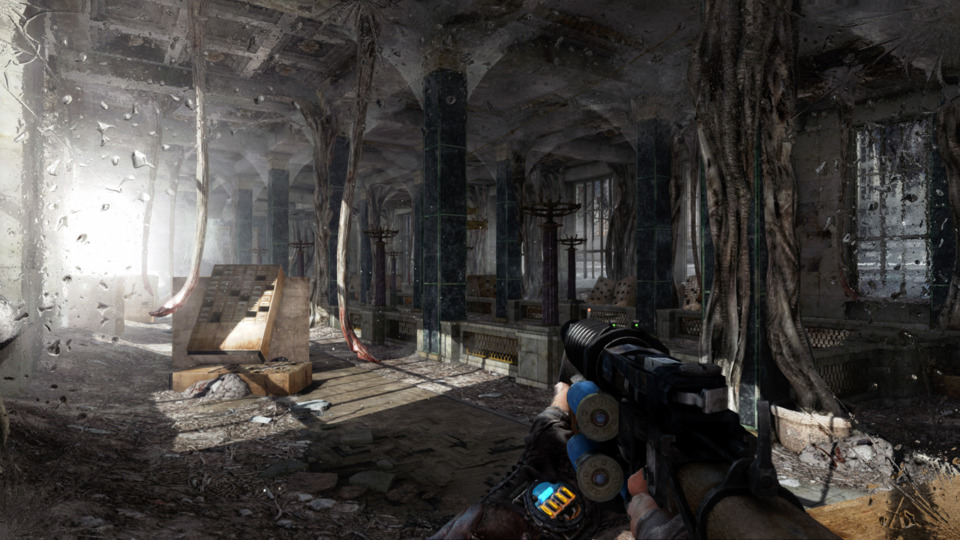
Several bugs did survive the upgrade process, nevertheless. Although guns fire the odd phantom bullet that passes through attackers, an aim assist slider and the inclusion of hit markers helped me account for misses and reliably put monsters out of my misery. I wish I could speak as highly of the melee, but the shoddy CQC remains broken. You might be six inches away from your target and yet you will miss without fail. If Call of Duty’s unstoppable melee was a lethal special forces operative, then Metro 2033’s melee would be the kid eating paste in class.
Other glitches exist, though I purposely hunted for them. Artyom walks through random NPCs, getting a look at their horribly hollow insides, and my favorite error replicates the big head glitch from last year’s Star Trek movie game. Aiming down your weapon’s iron sights when walking toward characters inflates their skulls to gigantic proportions. Is it a fault? Sure. Even so, I laughed every time.
Metro 2033 Redux does not ooze good feelings, of course. If you yearn for more Walking Dead styles of sadness, 4A Games’ series of depression is an excellent start. The bustling burgs beneath Moscow smell of hope, fear, and sorrow. With dozens of NPCs milling about their conversations, you can put aside the story for a while and let the denizens recount their tales. Metro 2033 Redux may not have outlandish FPS set pieces or voice actors that shame Hollywood, but it does have a cerebral narrative to tell, and it is worth hearing.
Written for WikiGameGuides.com. Like the review? Follow me on Twitter.
